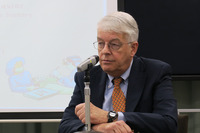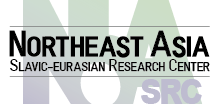Is the latest US-Russia reset dead on arrival?
Timothy J. Colton (Professor of Government, Harvard University and Distinguished Visiting Professor, National University of Singapore)
Before his successful election as president of the United States, Donald Trump was known for, amongst other things, cameo appearances in over 20 films and TV programs spread across the nineties and noughties. One popular show spanning these two decades that he didn't take part in though, was the medical drama ER (Emergency Room). Timothy J. Colton cut through the hubbub surrounding the 45th president's first 100 plus days in office to argue that while the supposed reset to US-Russia relations following Trump's election was not dead on arrival, the patient was on the emergency room operating table.
Placing the latest US-Russian presidential relationship in recent historical context, Professor Colton explained, reveals that Trump is but the latest in a long line of American presidents claiming to want to improve ties. Problematically however, events during first few months of the Trump presidency have introduced some irritants to the relationship. These include allegations of electoral shenanigans by Russia in America, and recriminations from Tomahawk missile attacks by the US in Syria.
Central to Professor Colton's lecture was the question of how to explain what such events mean for any reset. Using a rich selection of political cartoons drawn from a variety of American and Russian newspapers and magazines, he proposed four theoretical frameworks as being particularly useful. A systematic explanation would suggest leaders don't matter, hence, little improvement in the relationship. On the other hand, emphasizing leadership might indicate that limited experience in politics and a lack of advisory support meant that Trump didn't know what to do to improve ties. A third possibility was resistance - that the media, the Washington establishment, the national security complex, and Democrats and some Republicans were all working to hold Trump back. If Trump were to tweet his interpretation he would probably write something like this. For Professor Colton, however, the meddling factor held the greatest explanatory power. In this reading, Russian interference in the US election and the unplanned consequences that followed have made Russia too hot to handle - for now.
Professor Colton concluded his remarks by reminding the audience that the dark prognosis by some commentators of a new Cold War was misleading, and that areas for potential compromise existed including on arms control and over the Donbass Region in the Ukraine. When the two presidents meet for the first time, and if talks on these and other issues make progress, a workable narrative of 'strong meets strong' may offer the best hope for the patient moving out of the emergency room and, if not yet onto a ward, at least into intensive care.


 Eurasia Unit for Border Research (Japan)
Eurasia Unit for Border Research (Japan)




